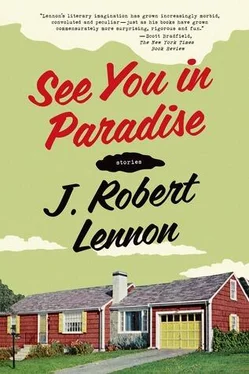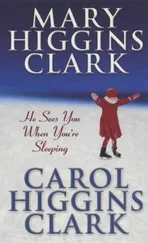“Relax.”
“This is my cottage!”
“I’m just gonna sit here by the fan until the jeep comes, all right?”
“No you’re not!” the replacement said, his arms flailing. He had cut off his chinos and the sleeves of his shirt.
I should have shat on the floor, Brant thought, while I had the chance.
In the end, he sat next to the road and dozed. The sound of the jeep woke him up. The fat guy unloaded the sack dinners and demanded money for the ride to the airport. Brant forked over what he had left. He was back home by morning, his house (thankfully, he had retained the lease) exactly the way he had left it. He took a shower, curled up in the hot and musty bed, and slept until the middle of the next day.
And that, he decided, was that. He got his job back, having after all secured the magic donation from Leyton Peck — who had not, contrary to Brant’s worst fears, reneged on the deal. He reclaimed his cubicle, endured the jokes, and tried to forget about Cynthia. He stayed off the internet and enjoyed the cool fall weather.
At some point guilt got the best of him and he tried to write a thank-you note to the family who had helped him through that terrible week. He managed a few lines about how grateful he was and how maybe someday they would meet again and stuffed it into an envelope, and then sat at the kitchen table trying to figure out how the hell to address it. He got as far as—
The family
First cottage
Behind the volcano
Guyamón
— before muttering “Fuck it” and tossing the whole thing in the trash. And then he had a change of heart. He reached into the trash can, picked out the crumpled paper, and smoothed it flat; then he dropped it into the recycling bin. After that he felt a hell of a lot better.
Five months after Philip and Evangeline were married, Philip dropped his briefcase and four folders worth of loose papers in a pedestrian crosswalk and was run down by an old woman in a large car who had failed to notice his crouched form in the road. The car’s fender — it was an SUV, a Chevy Tahoe — struck him just below the left shoulder, and he was knocked over and dragged forty yards down the street, resulting in the loss of much of the skin on his right arm. At this point Philip had broken only his humerus, collarbone, and several ribs, and might have been spared further injury had the driver noticed he was there. But she didn’t, and at the next corner the car loosed its grip on Philip, and he was thrown under the back right tire. The tire crossed him from hip to shoulder, breaking more ribs, all the bones of his right arm, and his spine. He was rushed to the hospital and remained unconscious for several days; when he woke, he was told that he was unlikely ever to walk again. Meanwhile, the woman who had run him down had continued on to Home Depot and bought three rhododendrons, a box of thirty-gallon trash bags, and a bottle of orange-scented kitchen cleaner, and when the police tracked her down, she snubbed them, apparently thinking they were collecting for the benevolent association. Eventually she would be given a two-hundred-dollar fine and a one-month suspension of her license. It was two months before Philip had even the strength to sit in the electric wheelchair Evangeline’s health insurance had almost, but not quite, covered, and another four before a settlement came through that, to Philip’s mind, could only be called modest.
Philip was forty-one; Evangeline was forty-three. They had no children and wanted no children. He was an accountant. She was an accountant. They both went by their full names and corrected anyone who mistakenly called them Phil or Angie. But such an occurrence was infrequent, as they had few friends. They lived in a small house on a quiet street one neighborhood over from the posh part of town, and by the time Philip had grown adept at maneuvering his wheelchair around the house, Evangeline had had a ramp constructed for his ingress and egress. Even so, winter had begun, and it was April before Philip ventured out.
When he did, Evangeline was at work, and his batteries ran out six blocks from home. The policeman he hailed was one of the two who had arrested the woman who ran him over, and on the way back to the house, with the wheelchair awkwardly wedged into the trunk of the cruiser, this man said to Philip, “You got a raw deal.”
“I suppose I did,” Philip replied.
“I’m sure you heard,” he went on, “but that lady’s nephew won the lotto and she moved to Florida.”
“No,” Philip replied, “I hadn’t heard that.”
The policeman carried him, fireman-style, into the house, laid him down on the sofa, and gamely saluted before leaving.

It would be fair, if not entirely accurate, to say that Philip’s accident and special needs put a strain on the marriage. Certainly, they were anxious now. But they had not been married long enough to know what normal was for them. They slept in the same bed, but never made love — Philip’s doctors disagreed on his prospects for sexual potency, and there had so far been no sign of its intruding upon their lives. That said, they had had little sex before the accident, either. Both of them claimed to enjoy it while in its throes, but neither had ever relished the negotiations, preparations, and embarrassments necessary for its initiation. They had friends — Bob from Evangeline’s office and his wife, Candace; Roy from Philip’s office and his wife, June — but after a few awkward bouquet-clutching visits to the hospital, Bob, Candace, Roy, and June disappeared, and nobody had come to the house since Philip returned to it wheelchair-bound. Occasionally Evangeline called them and left messages. Philip didn’t have the heart to tell her to stop. They did both like eating out, but had not got around to doing it much before Philip was hurt. They had liked to read on the sofa after dinner in the evenings, and they still did, but Philip was more comfortable in his chair, and usually became extremely sleepy at about eight thirty, after which his head would slump onto his chest, and his book would fall from his hands onto the floor. He had been reading the same crime novel since he came home from the hospital.
Evangeline was a tall, modestly attractive woman with prematurely gray hair, a full face, the figure of someone ten years younger, and the eyeglasses of someone twenty years older. Philip, before his accident, had stood at about five feet seven, but gave the impression of strength, owing to a broad upper body and narrow hips, and a strong, plain, blocky face. In fact, he had never been especially confident physically, and always believed he was about to develop back pain like his father’s, though he never did, until now, of course, when it was the least of his worries.
They only went on seven dates before they married, in a civil ceremony at the county courthouse. They had first kissed on the second date, gone to bed on the fourth, and gotten engaged on the sixth, and when, at their wedding, their families and coworkers had asked them who had proposed to whom, neither was able to come up with a definitive answer. It was the first marriage for both of them and, seventeen months after the wedding and a year after the accident, they both appeared certain that it would be the last.

Because their first anniversary, owing to Philip’s recovery, had been inadequately observed, he decided to take Evangeline out for their year-and-a-half. He hired a driver to bring them to and from the restaurant so that she wouldn’t have to drive him, and he practiced getting in and out of the car by himself, so that she wouldn’t need to do that, either.
Читать дальше













